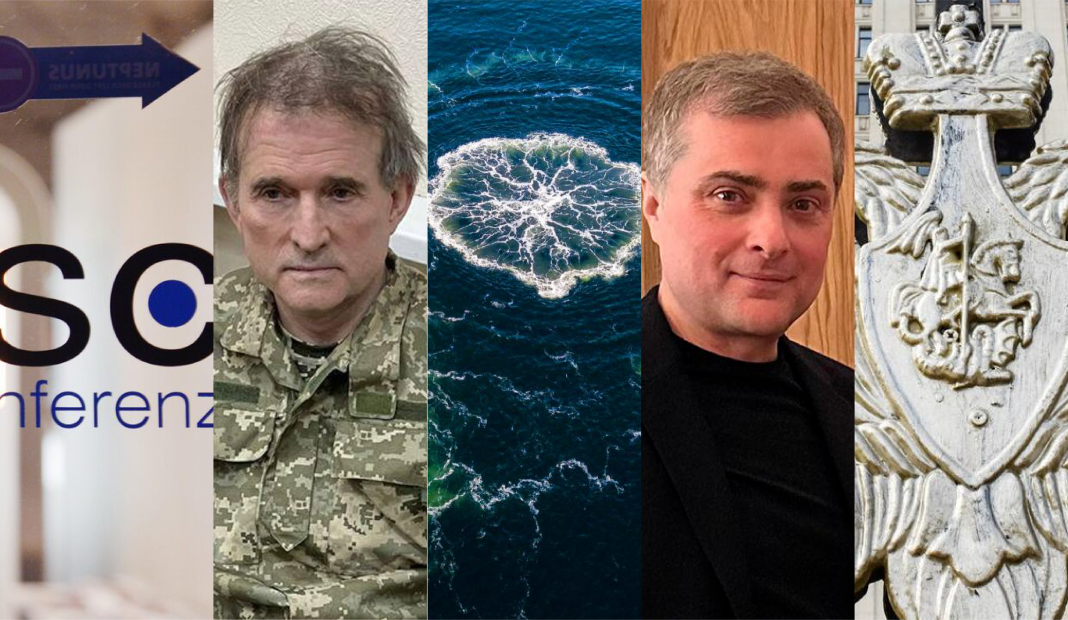This report describes the key events that had an important impact on the political, economic and social processes inside Russia.
Based on the results of the past week, the following key events can be brought to attention:
- Russia prepares for the anniversary of the invasion of Ukraine. Despite several assumptions by Western experts regarding a full-scale offensive, other options can be considered, up to freezing the conflict or continuing it in the same sluggish state. Quite indicative is the activation of China, which can make significant adjustments to the course of events in the geopolitical arena.
- The outlines of the global negotiation process, which involves not only the US and Russia but also China, the EU, the UK and several other states, are becoming increasingly visible. We can observe an attempt to fix positions: the Munich Security Conference, Joe Biden’s visit to Warsaw (with a possible visit to Kyiv), Putin’s message to the Federal Assembly, and Xi Jinping’s address. But, of course, all these events are an element of one game, the rules of which may become clear by the end of February.
- Russia is preparing for long wars, which can be both local and global. Attempts to crush Alexander Lukashenko and draw Belarus into the war against Ukraine are very revealing. At the same time, the issue of the legalisation of PMCs is being updated, which indicates preparations for protracted “hard times” and the emergence of new hot spots worldwide. Against this background, the reshuffles in the military leadership are very indicative, which, despite your “horizontal” nature, can also lead to a change in the top leadership of the Russian Ministry of Defense.
During February 13th -19th the following topics were the most relevant for Russia:
- Actualization of the Nord Stream gas pipelines blowing matter
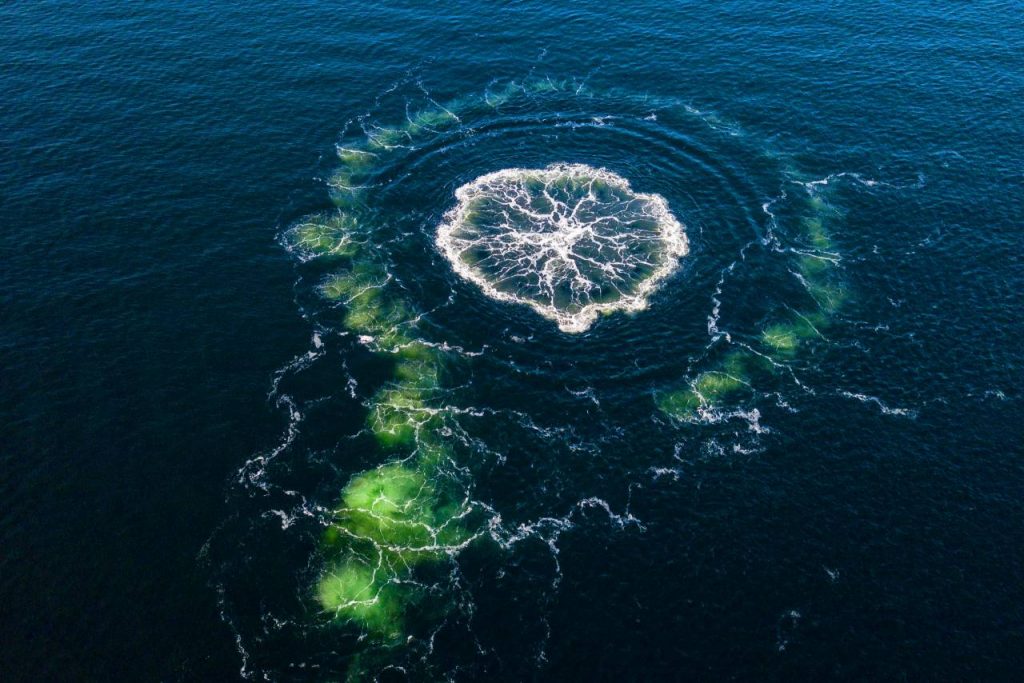
Recently, the issue of explosions on the Nord Stream gas pipelines, which occurred on the night of September 26, 2022, has been significantly updated in the information space. On February 8, American investigative journalist Seymour Hersh stated that US Navy divers planted explosives under Nord Stream in June 2022 during NATO exercises Baltops 22 using remotely activated devices. In September 2022, the Norwegian Navy allegedly triggered explosives by dropping a sonar buoy from a patrol aircraft. This information received an ambiguous response, but at the same time, it noticeably intensified discussions of already practically forgotten events. Last week, several sources began to discuss this issue at once, which renewed the international excitement around the Nord Stream gas pipelines and made this topic one of the most resonant in Russia.
Timeline:
- On February 16, Chinese Foreign Ministry spokesman Wang Wenbin noted that the major Western media ignored Hersh’s Nord Stream investigation: professionalism and impartiality fell into collective aphasia.”
- On February 16, American journalist John Dugan (a former American police officer who was granted asylum in Russia) told the Russian edition of RIA Novosti that he had received an anonymous letter from a participant in the Baltops-22 exercise, during which explosives could have been planted at Nord Stream. The letter allegedly states that on June 15, a helicopter delivered a group of Americans in civilian clothes, met by a vice admiral of the US 6th Fleet and people in civilian clothes. Those who arrived had professional deep-sea diving equipment, which the regular military does not use. After a conversation with the vice admiral, they sailed with some boxes on a rubber boat into the sea and sank under water for more than 6 hours. They returned without the boxes and were then picked up by a helicopter.
- On February 17, Russia prepared a draft UN Security Council resolution calling for creating an international commission to investigate the terrorist attack on the Nord Stream gas pipelines. The project calls for identifying the perpetrators of the sabotage, sponsors, organisers and accomplices.
- On February 18, during a meeting in Munich, the head of the office of the foreign affairs commission of the Central Committee of the Communist Party of China, a member of the Politburo, Wang Yi, warned German Foreign Minister Annalena Burbock that such events could be repeated if the war in Ukraine drags on: “We understand Germany’s concern over the crisis in Ukraine however, the longer the crisis drags on, the more damage will be done to Europe. Accidents similar to the explosions at the Nord Streams may suddenly repeat.
- On February 18, Seymour Hersh said he could provide new material on the gas pipeline sabotage. At the same time, he pointed to the role of Norway, Sweden and Denmark in preparing the explosions but did not disclose the details of their participation yet.
Outcomes and outlook:
Even though the topic of explosions on the Nord Stream gas pipelines is challenging to study (it is necessary to conduct many examinations in which neither side is interested), Seymour Hersh’s study caused an absolute flurry of emotions in the West. Even if this study was paid for by Russia (which many Western experts do not doubt), it only means that Russia has put the West in an awkward situation, forcing them to make excuses. She intercepted in this way the tactics of the West, which had previously made weakly substantiated accusations against Russia regarding the poisoning of the Skripals, Navalny and many other topics. The fact that the matter was picked up in China shows that several countries will now build a mirror policy towards the West: make accusations, admit their evidentiary part without iron argument, and force the West to react, refute, and further aggravate the situation.
In this regard, Hersh’s investigation, even if it is far-fetched (but in fact, it is very plausible, which is not evidence of veracity), is historical: the world has completely plunged into the post-truth abyss, in which the reliability of information does not play any role – the main thing is influence, which this information has on the course of political events in the world.
- Issue of Russia in Munich Security Conference
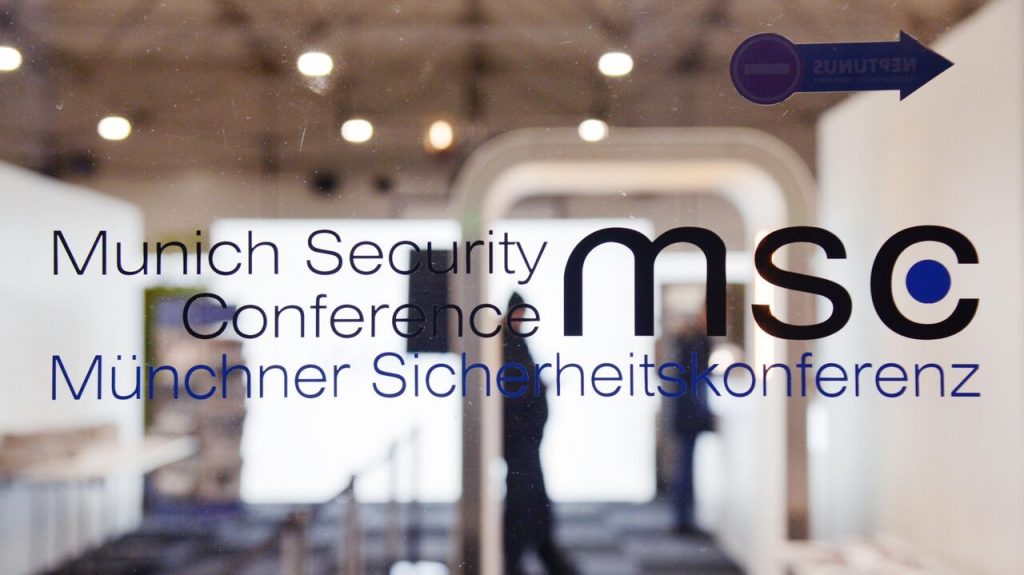
On February 17-19, 2023, the 59th Annual Security Conference was held in Munich. This time it hosted participants from 150 countries, including German Chancellor Olaf Scholz, French President Emmanuel Macron, Politburo member of the Central Committee of the Communist Party of China Wang Yi, US Vice President Kamala Harris, US Secretary of State Anthony Blinken, NATO Secretary General Jens Stoltenberg and others. One of the main topics discussed during the conference was the Russian invasion of Ukraine and the future of Russia in general. All the key speakers raised this topic at the conference.
Key statements on Russia:
- Volodymyr Zelenskyy compared Ukraine and Russia to David and Goliath (a biblical story), stating that “Goliath has no chance. But, unfortunately, there is potential. Unfortunately, by trading with the world, he tries to buy himself time for aggression. It can destroy many more lives. That’s why we must hurry. We need speed. The speed of our arrangements. The speed of supplies to strengthen our sling. The speed of decisions limits the Russian potential. But, unfortunately, there is no alternative to speed.”
- US Vice President Kamala Harris: “We have studied the data, we know the legal procedures – the actions of the Russian army are a crime against humanity. This is our official position. I want to say that the crime participants will be held accountable.”
- Head of European diplomacy Josep Borrell: “I travel around the world, especially in the global south, and I see how strong the Russian narrative is, which wants to reduce the war in Ukraine to a conflict between the West and Russia, with many accusations of double standards. We must debunk this narrative and explain how Russia operates as an imperial power. President Macron announced a new colonial power. Yes, that’s how it is; let’s put it this way. This is the imperialist position of a powerful neighbour who wants to take control of someone who belongs to his political sphere.”
- French President Emmanuel Macron said he favours Ukraine’s victory in the current war but does not want Russia “to be crushed.” In an interview with French journalists on the sidelines of the conference, Macron said: “I want Russia to be defeated in Ukraine, and I want Ukraine to be able to defend its position.” At the same time, he suggested that due to the conflict, neither side could gain an overwhelming advantage. “I am convinced that in the end, everything will not end militarily,” said the French President. Macron added that, unlike some, he does not want the war to spread to the territory of Russia itself. Such people, as Macron said, “first of all want to crush Russia.” “This has never been the position of France – and never will be.”
- British Prime Minister Rishi Sunak was quite categorical: “The agreements and arrangements of the Cold War era failed; they let Ukraine down. We need a new legal framework to keep the peace. After all, Russia, starting from Georgia and ending with Moldova, committed violations of the basic provisions of international law.”
- NATO Secretary General Jens Stoltenberg: “The Kremlin wants to create a different Europe, where Russia will control its neighbours. We also know that Beijing is watching this closely to see what price Russia is paying and what reward it will receive for its aggression. What is happening in Europe today can happen in Asia.”
- US Secretary of State Anthony Blinken: “Putin mistakenly believes that NATO wants to commit aggression against Russia; never will be. Putin, to his credit, has helped strengthen NATO since 2014.”
- German Foreign Minister Annalena Burbock welcomed China’s initiative for a settlement plan in Ukraine, saying, “as a permanent member of the UN Security Council, China must use its influence to ensure world peace.” Also, Burbock misspoke and stated, “if Putin does not turn his policy around 360 degrees, then there is no way to ensure the security of Ukraine on a long-term basis under his rule.” Multiple commentators reminded Madame Minister that in the case of a 360-degree turn, a person would be at the starting point, not at the opposite end.
- Olaf Scholz said there is no unity within Germany regarding sanctions against the Russian Federation and the supply of weapons to Kyiv.
Outcomes and outlook:
The Munich Security Conference in 2023 was planned as a response of the “collective West” to Vladimir Putin’s speech (on the same platform) in 2007, which many consider the beginning of a new “cold war” between Russia and the West.
In this case, the “collective West” tried to demonstrate unity and full consensus in opposing Russian ambitions. At the same time, the issue of providing weapons to Ukraine has become the most effective demonstration of such unity.
It is important to note that in the situation with Ukraine, the West lost one of its main trump cards – the “peacekeeping mandate”, with the help of which peace processes were implemented on the conditions of the West in several states. In fact, Russia’s war against Ukraine has turned out to be at a stage where victory for Ukraine and the West can only consist of the complete occupation of Ukrainian territories (including Crimea). Still, no one voices confidence in the implementation of such plans shortly. Accordingly, a dilemma arises: how to quickly end the war while maintaining our positions?
In this situation, China is becoming increasingly active in counterbalancing the West, declaring the need for a speedy settlement of the situation in Ukraine and even announcing its vision of a possible negotiation process. It is possible that China is more inclined to make territorial concessions and is ready to change the world order not so much on Russia’s terms but on terms unfavourable to the United States.
Quite indicative is the hype around the figure of the head of the office of the Foreign Affairs Commission of the Central Committee of the Communist Party of China, Politburo member Wang Yi, and the activation of Alexander Lukashenko as a possible negotiator on Ukraine. The main trump card of China remains the ability to negotiate with Russia: conditionally, if Russia agrees to end hostilities, and China confirms that Moscow has achieved its goals, then such a situation will be very advantageous for Russia (even without any territorial victories.
The Munich Conference can also carry many meanings and hints for Russia. Representatives of Western states tried to lift the veil of the fact that US and European support for Ukraine does not consist only of the provision of weapons. Hence the panel with the Russian oppositionists Khodorkovsky and Kasparov, as well as several other statements from world politicians.
It is worth noting that we are currently witnessing a global negotiation process similar to the one that was held in mid-January 2022 (Russia-NATO and Russia-OSCE summits). We have already seen statements from the West, but there is still Putin’s Address to the Federal Assembly and the Chinese peace proposals announced by Beijing. Apparently, after these events, the complete geopolitical picture with the current alignment of forces will be clear.
- Appointments of new commanders of military districts in Russia
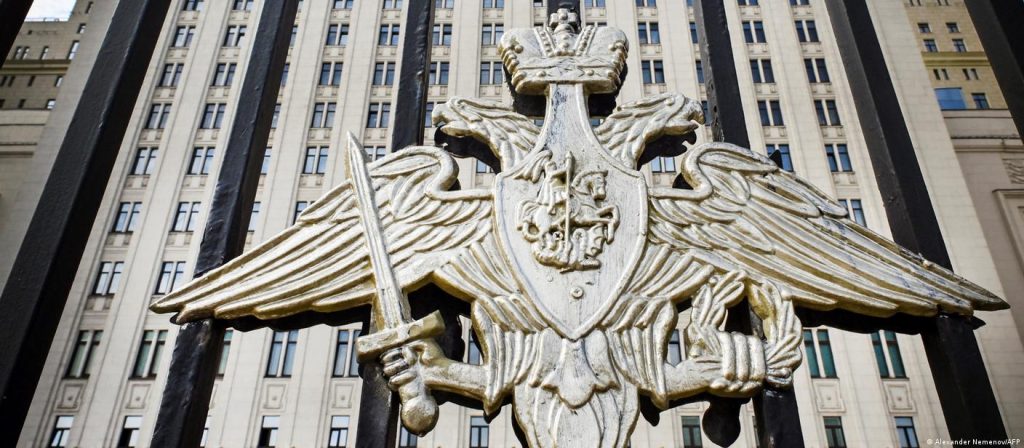
On Friday, February 17, the Ministry of Defense of the Russian Federation’s website updated information about the commanders of military districts. According to published data, Andrey Mordvichev is named commander of the Central Military District, Yevgeny Nikiforov is named commander of the Western Military District, Sergey Kuzovlev is named commander of the Southern Military District, and Rustam Muradov is in command of the Eastern District.
Outcomes and outlook:
Putin continues to reshuffle top command positions. And if the formal appointment of Andrei Mordvichev took place two months ago (the update of information was late), the appointments of Kuzovlev and Muradov took place over the past month. For two decades, Putin did everything to protect himself from a possible “military conspiracy”, as he was afraid of a repeat of the incident of General Rokhlin (in the 90s, he was preparing a military coup in Russia to eliminate Boris Yeltsin and the pro-Western leadership of the Russian Federation). As a result, in the “second army of the world”, there was a selection of mediocrity at the head of the army: career advancement was provided by ultra-loyal, lack initiative and greedy people who would be easy to manage. Running in the conditions of Syria showed that not all generals are capable of command functions. The so-called “SMO” in Ukraine showed the professional unsuitability of many generals, which led to the need for constant rotations. For many, this is already the third or fourth rotation in a year. The low authority of Defense Minister Sergey Shoigu in the army, conflicts between 4-5 groups of generals, inability to take a creative approach to assigned tasks, fear of taking the initiative, rigidity, and corruption – these are the main qualities that lead to the failure of military functions on the fronts.
The Red Army faced the same problem by the end of the 30s: Stalin solved the issue very radically, destroying the “snickering cats” that were not adapted to the tasks of the war of the new time and making it possible for new commanders to come forward who were not afraid to make decisions, going beyond the charters and circulars. The mediocre campaign in Ukraine will most likely lead to the opening of vertical elevators after horizontal movements in the army.
At the same time, as we wrote above, it is planned to introduce changes to Russian legislation to legalise private military campaigns shortly. The high efficiency of the Wagner PMC against the backdrop of the failed actions of the Russian regular troops caused this step. It also aims to increase competition in the military sector (personnel and technology).
In this situation, it is important to note two factors. First, Ramzan Kadyrov recently announced his desire to create his PMC. In connection with the liquidation of the post of presidents of the republics (which is gradually happening throughout Russia), he may shortly leave public politics and focus on other tasks related to military affairs. At the same time, Kadyrov’s recent title of “Mekhk-Da” (Father of the People) suggests that he will continue to be the head of Chechnya.
Secondly, the legalisation of PMCs in Russia speaks of Moscow’s readiness to conduct local or full-scale wars shortly. With the help of PMCs, the problem with the participants of the so-called “SMO” will be partially solved, which will help avoid the aggravation of the crime situation in Russia and open up the opportunity to expand their own military presence without involving the army. Russia effectively uses this strategy in Africa.
- Viktor Medvedchuk’s interview on Channel 1
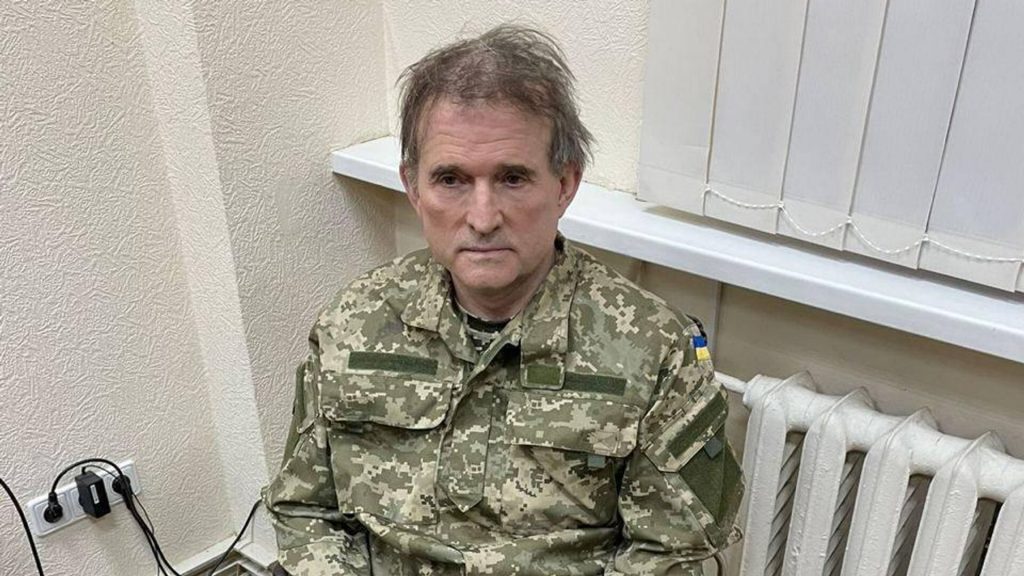
On Thursday, February 16, Russian Channel 1 aired an interview with Viktor Medvedchuk, a former Verkhovna Rada member and the Opposition Platform leader. Like Medvedchuk’s previous appearances in the information space, this interview was built on the theses about “good” and “bad” Ukrainians, Russia’s “liberation” actions and total criticism of the West. As Ascolta noted, such messages were not aimed at the Ukrainian consumer.
Key theses:
- Medvedchuk told how on April 12, 2022, he was detained by territorial defence representatives and later transferred to the Security Service of Ukraine. According to him, he spent several months in handcuffs.
- He stated that no physical violence was used against him but that everyone “tortured him with exceptional hatred”.
- “I didn’t leave Ukraine – I was exchanged”.
- “There are much more nationalists in Ukraine than radical nationalists. But there are no more than 10% national radicals. The West actively supports these people.”
- “Russian and Ukrainian peoples should remain as close as before. We need to find the right words.”
- “Anti-Russia from Ukraine began to build in 2005.”
- “Kyiv without Russia is not possible and not conceivable.”
- “Angela Merkel’s statement about the “Minsk agreements” is yet another proof of the duplicity of the West.”
- “Two reasons for the start of the [so-called] “SMO” are the implementation of the Minsk agreements and the announcement of Ukraine’s non-bloc status.”
- “The West imposed national radicals on Zelensky, who runs the show in Ukraine.”
- “I am the constitution’s author, according to which Ukraine lives today.”
- “Everything can be fixed, and the key to a common future is a common history.”
- “We need to show that there is another Ukraine. We must unite to stop Zelensky’s criminal activity.”
Outcomes and outlook:
For the third week in a row, Medvedchuk has become one of the essential newsmakers in Russia, which is also reflected in Ascolta’s weekly digests. At the same time, attempts to create the right image for Medvedchuk, with work on his biography, political “merits”, and possible failures, are becoming increasingly noticeable.
It is not for nothing that the interview on Channel 1 begins precisely with his photograph in handcuffs and the uniform of the Ukrainian military. Also, the first part of the interview is devoted to Medvedchuk’s story about his detention and exchange. It is very streamlined to talk about the conditions of detention but focuses on the fact that he did not cooperate with the SBU or share any information with them.
Following the description of his detention and exchange, Medvedchuk talks at length about his father, a Ukrainian nationalist, trying to justify his actions partially (Medvedchuk states: “my father was not a “Benderite”, but a “Melnykist”. Considering that this interview is designed for an internal consumer, first of all, it should be regarded as a game ahead of the curve to confuse opponents’ cards).
In general, one gets the impression that they are trying to mould Medvedchuk as a dissident who suffered and survived all possible troubles from the so-called “national-radical” regime that seized Ukraine.
Viktor Medvedchuk continues to play “another Ukraine”. However, his rhetoric and statements are directed not so much to Ukrainians as to the Russian consumer of information. Russia needs it as an example of an “alternative Ukraine”. The official Russian ideology claims that the war is not being waged with Ukraine and not with the Ukrainian people but with the “Nazis” who seized power in Kyiv and are puppets of the US and NATO. In contrast to these “wrong” Ukrainians, the “correct” Medvedchuk is presented.
Obviously, his appearances in the Russian media will continue, and he will remind himself of himself with a specific frequency. True, with an efficiency close to zero.
- Vladislav Surkov’s interview
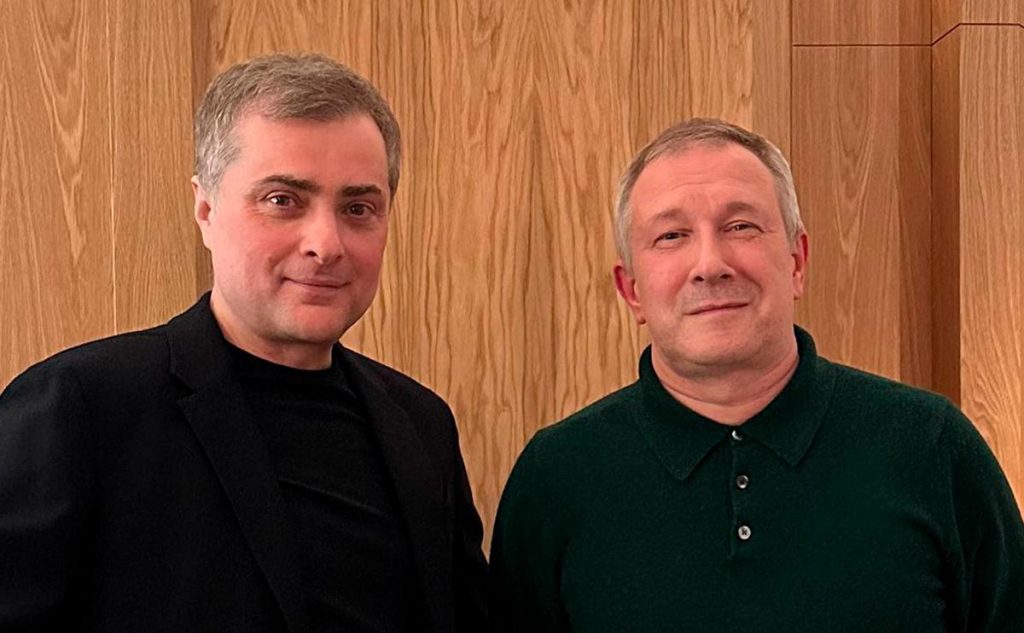
On Thursday, February 16, Russian political scientist Alexey Chesnakov published a photo with Vladislav Surkov on his Telegram channel, signing it “interview with V. Yu. Surkov”. Unfortunately, the interview itself appeared to consist of only four questions, to which short yes or no answers were given:
1. “A year ago, a week before the start of the SMO, you predicted that Russia would expand its western borders. Are you satisfied with how it’s done?”
– YES.
2. “Do you consider the actions of our army effective?”
– YES.
3. “When working on the Minsk agreements, did you proceed from the fact that they must be implemented?”
– NO.
4. “Will relations between Russia and the West normalise in the foreseeable future?”
– YES.
Outcomes and outlook:
Vladislav Surkov decided to remind himself, showing that he was ready to return to big politics. The “interview” that he gave to his closest colleague Alexei Chesnakov, only at first glance, is of a frivolous, playful nature. The answers to the questions were combined in such a way that the famous (but now almost forgotten) formula of the referendum on April 25, 1993, “Yes – Yes – No – Yes”, was obtained (it was in this sequence that the authorities suggested that Russian citizens vote for the four questions submitted to the referendum – about confidence in Yeltsin and early elections of deputies). Surkov’s answers are also combined into the formula “Yes – Yes – No – Yes.”
The very wording of the questions hides no less meaning than the answers. Based on the answer to the third question, we can assume that it echoes the recent statements of Angela Merkel and François Hollande, who stated that they initially did not believe in implementing the Minsk agreements. Surkov also confirmed that he did not believe in their performance. Thus, the Minsk agreements can serve as a precedent for an international treaty, the signing of which was initially based on its total non-fulfilment and disregard.
Also interesting is the answer to the question of whether relations between Russia and the West will normalise shortly. Surkov answered in the affirmative. Surkov clarified that the negotiation process is underway, and some progress has already been made. Moreover, the Ukrainian issue is only an active manifestation of contradictions between Russia and the West.
Surkov, who has recently acted as a classic “hawk” and spokesman for the will of the warring forces and a lobbyist for the interests of the self-proclaimed “republics”, hinted that he is pleased with the gains that have already been made (that is, if a project to “freeze” the conflict is proposed, he it will most likely be supported). Also, Surkov did not join forces with Prigozhin and Kadyrov, who actively criticised the command of the Russian Armed Forces (although many people predicted that Surkov would join this alliance).
It should be assumed that Surkov’s activation may also be related to Beijing’s recent announcement regarding the presentation of its plan for a peaceful settlement of the situation in Ukraine. If Russia agrees to China’s conditions and agrees to freeze the conflict, Surkov may return to the clip and lead the political processes in the occupied territories. At the same time, to confirm this theory, it is necessary to wait for official statements from China.

